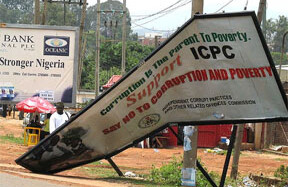Presidential elections were held in Nigeria on April 21st amid electoral chaos and mild violence. For the first time since the nation's independence from Great Britain in 1960, power was passed from one civilian government to another, rather than through a military coup. Twenty-four candidates ran in the highly contested race that left the opposition and many international observers calling for a re-run.
The winner was 55-year-old Umaru Musa Yar'Adua, a Muslim from Katsina State in northern Nigeria. He was outgoing President Olusegun Obasanjo's handpicked successor for the People's Democratic Party. It was during Yar'Adua's governorship in Katsina that the case of Amina Lawal came to international attention. Ms. Lawal was sentenced under sharia law to death by stoning for adultery. Her case was eventually overturned in an appeal.
Voter turnout was estimated at 58 percent, though that figure is unreliable due to voting inconsistencies. In many areas, polling stations were opened late or not at all, after dark in some cases. At other stations, ballots lacked the candidates' names, were printed with only a party symbol, or were missing the serial numbers that would ensure an accurate count. Delays were rampant because ballots were stored abroad to avoid tampering and only flown into the country at the last minute.
Reactions from election monitoring agencies were generally negative. Innocent Chukwuma, head of Nigeria's own Transition Monitoring Group, stated that members of the Independent National Electoral Commission "failed willfully in their responsibility to conduct free, fair and credible elections." The response from the Economic Community of West African States was a tepid "fairly acceptable." And election monitors from the U.S.-based International Republican Institute reported that this election "falls below the standards which Nigeria itself has set in previous elections and also falls below international standards."
Despite the presence of approximately 500 international observers and support from the international community, Nigeria's flawed and perhaps invalid elections could spur more violence in the coming weeks. The European Union reported that at least 200 people died in poll-related attacks already. The new government is scheduled to take office on May 29. The judiciary would normally hear complaints about election results, but it has been slow in decision-making in the past and may be bypassed altogether. Opposition leaders have called on the parliament to void the elections. They have also encouraged street demonstrations throughout the country.
At the heart of Nigeria's violence and poverty is government corruption, which has continued throughout the country's democratic experiment. Nigeria is rich in oil resources, exporting about 2 million barrels of crude per day. 93 percent of oil revenue goes directly to the government. If this revenue were distributed fairly, Nigerians would be quite well off.
Nigeria has the second-largest economy in Africa. Despite this immense wealth, 70 percent of Nigerians live on a dollar or less a day, unable to afford clean water, generators for electricity, or education. Ironically, some of the country's poorest areas surround oil-company compounds. Nigeria's top anti-corruption official, Nuhu Ribadu, reports that between 1960 and 1999 more than $380 billion was stolen or wasted. Over that same period, oil revenue was $400 billion. Though President Obasanjo ran for office in 1999 on campaign promises to improve infrastructure, basic services are still unavailable, unemployment has increased, and corruption continues.
The legacy of military involvement in government is a challenge for most new democracies in Africa, where the separation between civil and military authorities is often blurred. Once the military steps back and allows a civilian government to rule, it can either aid in the promotion of democracy, or lurk in the background, poised to take over if it disapproves of civilian leadership. Nigerians, fed up with the unfulfilled promises of democracy, would likely accept a military coup. In 2005, only 25 percent of Nigerians were satisfied by the way democracy was practiced in the country, down from 84 percent in 2000, according to an Afrobarometer survey.
President Obasanjo has publicly recognized the flaws of the April 21st elections, yet he believes the results should be accepted. "You cannot use European standards to judge the situation in a developing country," he said. Obasanjo's optimism aside, some measure of fairness must be used in order to ensure peaceful transfers of power. Lowering expectations is a dangerous attitude to adopt for democracy promotion.




